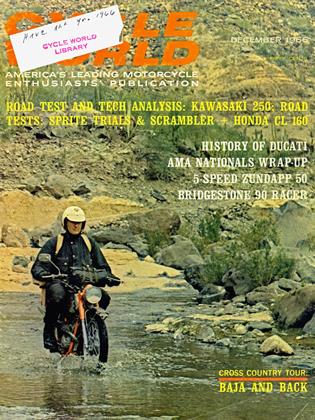EUROPEAN SPEEDWAY FINAL — Wembley, England
GAVIN TRIPPE
AFTER MANY QUALIFYING HEATS all over Europe, the top seeds in the world of speedway met at the European final at Wembley stadium in London.
Not even the world final at Gothenburg in Sweden will produce a more cosmopolitan bunch than graced the final qualifier at the Olympic-type stadium at Wembley. Three Englishmen, two Scotsmen, two New Zealanders, a Norwegian, a Russian and no less than seven Poles, with another Englishman and a Czech in reserve.
The atmosphere was electric as daylight started to fade, and the arc lights were turned on in the huge stadium, where only a few weeks previously, the World Cup football matches were fought out in England’s favor.
The hard shale track of Wembley is about 330 yards around, each heat being run over four laps with four riders competing. The start is by an electric starting gate with tapes that fly up, and all the riders are matched once with every other competitor. The approximate time for a four-lap race is just over a minute.
Three times world champion, Barry Briggs of New Zealand, was a firm favorite, but was having to ride with a plaster on a cracked shoulder. So second choice was Russian Igor Plechanov. As it turned out, neither of these two won, the surprise of the meeting being another young New Zealander, Ivan Mauger.
By really slick “gating” (some say a little too slick), he demolished the opposition to take the title. But, ironically enough, the only man to beat him was his fellow countryman, Barry Briggs, who eventually finished second.
The best of the Poles was Antonin Woryna, who finished third. He dropped a point in an effort to get another of his countrymen into the final and surprisingly beat Barry Briggs in their heat.
The 20-heat program had a peculiar pattern, Woryna finishing a poor third behind Mike Broadbanks (GB) and Sverre Haarfeldt (Norway) in his first outing. Although Woryna was slow starting, his fellow Pole, “Wild Man” Konstantyn Pociejkowicz, went like a rocket in the first heat of the night to win from Nigel Boocock (GB). That seemed to be his big effort, for he did not shine anymore, but slow starter, Woryna kept on improving, going on to beat Briggs and Plechanov, only to succumb to Mauger after a thrilling heat 13 battle. He looked all set to win the last race of the evening, but combined with compatriot Pociejkowicz behind Stanislaw Tkocz, to keep Ken MacKinlay (Scotland) in fourth place and out of the final, and keep Tkocz in front and in the final. This was typical of the Polish team spirit, as they were determined to get as many in as possible to the world final. Woryna, Tkocz, Pogorzelski and Kaiser all qualified.
(Continued on page 106)
continued
Of the others who qualified, Igor PIe chanov dropped a few dangers, but got through easily enough, as did the Norwe gian. Sverre Harrfeldt. The British boys, Nigel Boocock and Mike Broadbanks, showed enough fire to satisfy the home supporters, both scoring consistently. Ken MacKinlay. of Scotland. qualified as re serve for the final in Sweden.
THE THREE TOP MEN.
Ivan Mauger was runner up to Barry Briggs in this year’s British final. He came to England in the late ’50s and rode as a junior with the London Wimbledon team. He did not make the grade and returned to his native New Zealand, coming back to England in 1963, when he rode for Newcastle in the former Provincial League. He still rides for Newcastle and is improving with every season. Last year his World Championship efforts were stopped by injury. Currently, Mauger is a member of the British team, and this will be his first World Final.
Barry Briggs, also from New Zealand, was World Champion in 1957 and ’58 and again in '64. Barry recently completed a hat-trick of British championship wins when he won this year’s with maximum points. He has won or held nearly all British titles and championships at some time or other and holds numerous track records.
Briggs came from Kiwi Land to ride for Wimbledon in 1952 and it is difficult to imagine that the young man who found it so hard to stay on then is the same Barry Briggs of today. He qualified for his first World Final in 1954 — the same year as the late Peter Craven and Swede Ove Fundin, two of the world’s greats, and has had a great record since. He was third in 1955; joint fourth in '56: winner in ’57 and ’58; third in ’59; sixth in '60; fourth in ’61; runner-up in '62; third in '63; winner ’64 and third in '65. He rides for the Swindon team and also competes in many continental grass and sand track races. He is tipped to win the title again this year.
Twenty-five-year-old Antonyn Woryna rides for Poland and the ROW Rybnik Club. Making his international debut against Russia in 1961, he has really made news over the past two years. Woryna was third in last year’s European Final, earned six points in the World Final, and is also a member of the Polish World Cup winning team. He reached this year’s European Final after finishing runner-up in the Continental Final. ®












